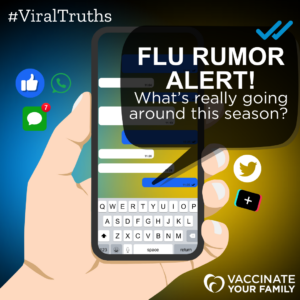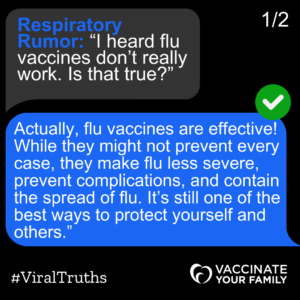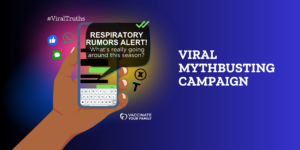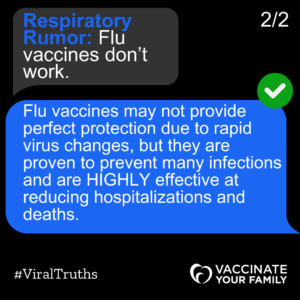Flu vaccines DO work, here’s how we know

Flu Rumor Alert! #ViralTruths
Flu vaccines are recommended every year because they save lives.
Every fall and winter, influenza viruses circulate in North America. Before the flu season begins, researchers are hard at work updating our seasonal flu vaccines to match the strains of the virus that are expected to spread. Updating the vaccines each season takes a lot of time and resources, but the cost is worth it to protect you and your loved ones.
Despite all the hard work that goes into making flu vaccines every year, you may have heard the claim that flu vaccines “don’t work”. Like viruses, rumors love to circulate during respiratory disease season, so let’s take a deep dive into why this myth isn’t true.
Flu vaccines protect you and the people around you
Flu is more than “just a bad cold”. While most healthy people who contract flu will recover, influenza can lead to severe complications and even be deadly for vulnerable groups, such as older adults, pregnant people, young children, and people with chronic health conditions. According to the CDC, in the 2022-2023 respiratory disease season, flu vaccination prevented 6 million flu-related illnesses, 65,000 hospitalizations, and 3,700 deaths. Vaccines are the best tool we have for reducing serious illness and keeping our loved ones safe.
Flu vaccines prevent many, but not all, infections
 Flu vaccines work well at preventing serious or even deadly disease, but the protection they provide isn’t always perfect. You may have heard someone say that they still got the flu even after getting a flu vaccine, so what was the point of getting vaccinated? There are many reasons why a person might experience flu-like symptoms after their flu shot:
Flu vaccines work well at preventing serious or even deadly disease, but the protection they provide isn’t always perfect. You may have heard someone say that they still got the flu even after getting a flu vaccine, so what was the point of getting vaccinated? There are many reasons why a person might experience flu-like symptoms after their flu shot:
- Flu vaccines can cause mild, temporary side effects such as headache, muscle aches, or a low-grade fever. These common side effects are a sign that your immune system is working and your body is building protection against the flu.
- Flu vaccines only provide protection against influenza. Someone might think they have the flu when they’re actually sick with a different illness that spreads during respiratory disease season, like COVID or RSV.
- Vaccination takes 2 weeks for your body to build immunity, so it’s possible to encounter flu viruses before or shortly after your flu shot, before the vaccine can protect you.
- There are many different flu viruses that spread and cause illness. Flu vaccines are updated every year to best match the flu viruses that are expected to circulate, but you might encounter a flu virus that’s different from the ones the vaccine is designed to protect you against. Even in this case, flu vaccination has been shown to reduce the severity of illness in people who got vaccinated but still got sick with influenza.
- Flu vaccines don’t provide perfect protection – you CAN still get sick with influenza if you get a flu vaccine – but getting vaccinated is proven to make flu symptoms less severe and the infection less dangerous if you do get unlucky and catch a flu virus.
Researchers work hard to make sure vaccines are safe and effective for you and your loved ones. Even if they might not provide perfect protection, flu vaccines are still the best way to prevent serious illness from influenza.
Flu vaccines are studied thoroughly
Vaccines go through far more rigorous testing than multivitamins at the grocery store. Before a vaccine can be recommended, it goes through a laboratory research process, which can take 10-15 years. When it’s proven to be safe and effective, it moves on to multiple clinical trials that enroll thousands of people. Even after they’re recommended, vaccines continue to be monitored for safety. This long process of developing, testing, and approving a vaccine ensures that it’s not only safe for you and your family, but it’s effective at preventing serious disease. Health experts recommend getting an annual flu vaccine because years of data show that flu vaccines work!
For more information about the 2024-25 flu season, click here.

What’s Really Going Around This Season?
Fall and winter bring a surge in respiratory viruses like flu, COVID, RSV, and the common cold—and with them, plenty of misinformation. Vaccinate Your Family (VYF) is here to help with our new Viral Mythbusting Campaign! Get the facts, debunk the myths, and stay informed. Check back weekly for new blog posts tackling the latest viral rumors and learn how to protect your family and community this season!
You can participate in our Viral Mythbusting Campaign by sharing the importance of busting respiratory disease myths on your social media platforms. VYF offers a free downloadable toolkit that follows an evidence-based format for combatting misinformation: lead with the fact, warn about the myth, explain how the myth misleads, and finish with the fact. Sometimes called a “truth sandwich,” this is a proven way to address respiratory rumors.
To join:
- Visit our campaign webpage
- Access our campaign toolkit
- Share any time during this respiratory disease season
- Use hashtag #ViralTruths and tag @vaccinateyourfamily on IG and FB, @vaxyourfam on X so we can amplify your posts!
To find drafted flu myths social copy and downloadable graphics, click here.

Additional Resources
VYF provides up-to-date information on vaccine safety and access on our website. View our current programs to learn more about our services and ways to get involved.
For more information: